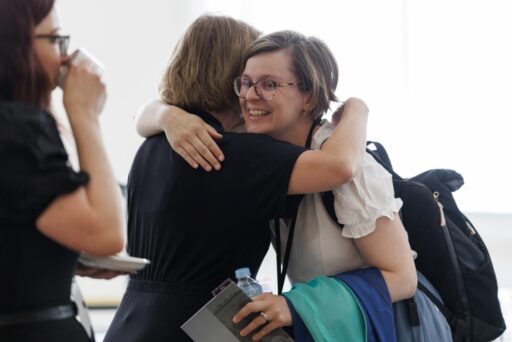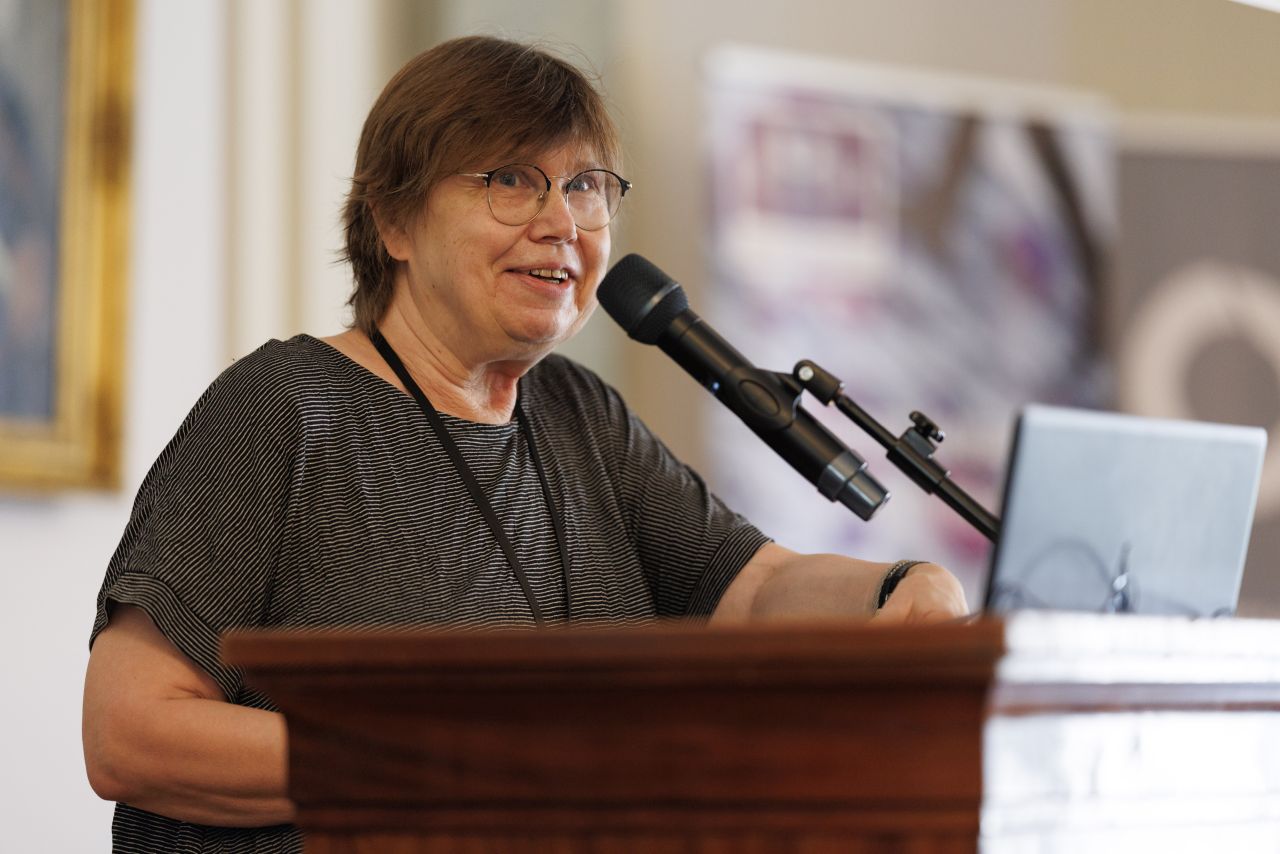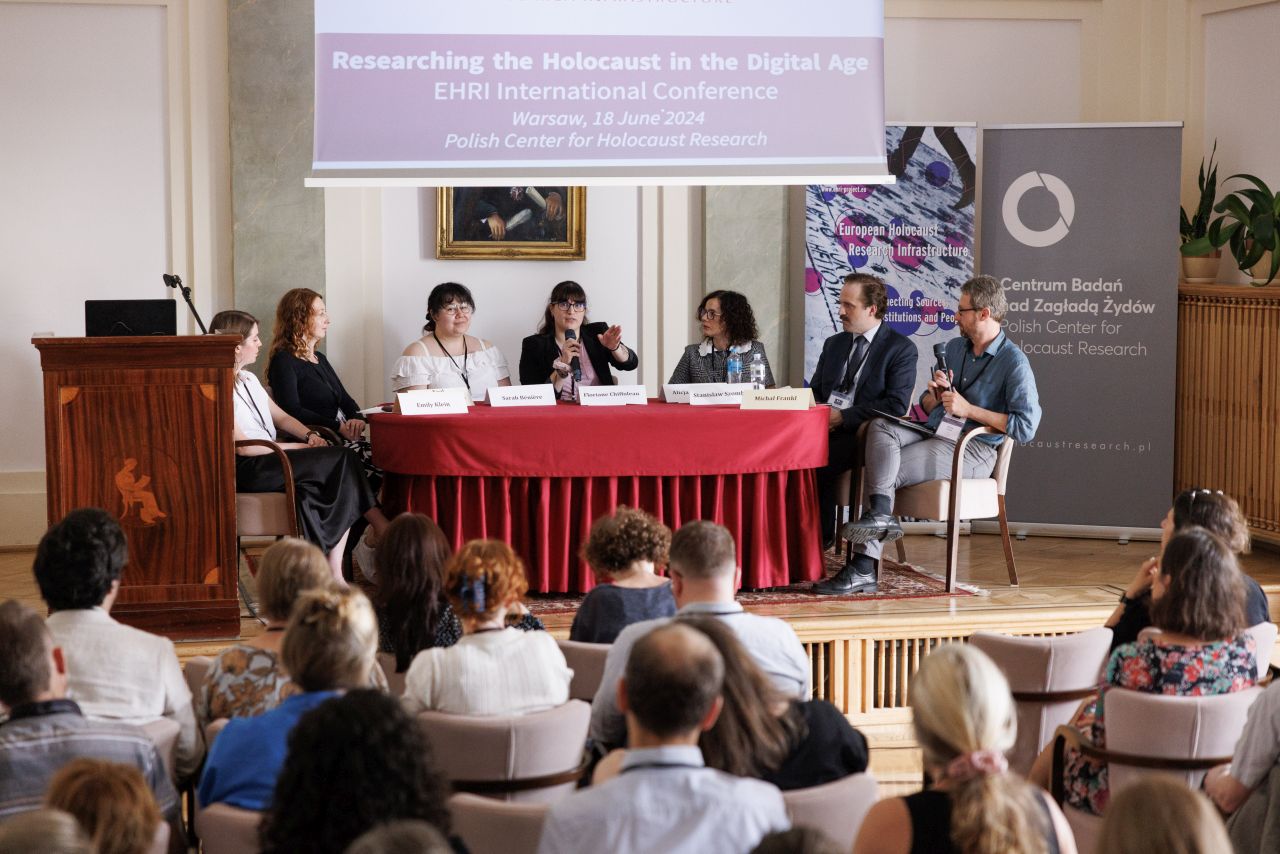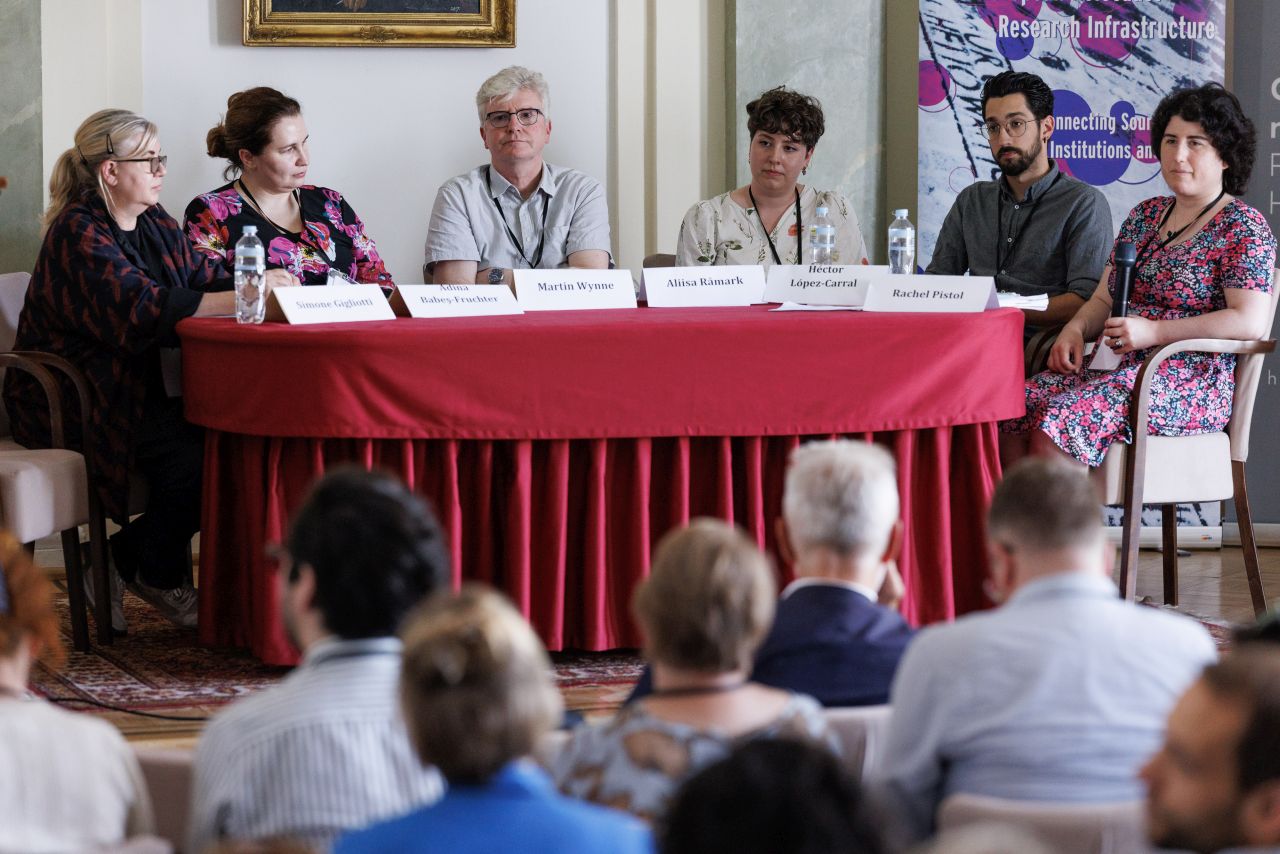EHRI Academic Conference in Warsaw: Researching the Holocaust in the Digital Age

On Tuesday 18 June 2024, the European Holocaust Research Infrastructure (EHRI) project hosted the international academic conference “Researching the Holocaust in the Digital Age” at the Staszic Palace, home of the Polish Center for Holocaust Research in Warsaw. EHRI partners in Poland, the Polish Center for Holocaust Research and the Jewish Historical Institute were co-organisers of the conference.
A recording of the conference with time schedule is available on our YouTube channel or on this webpage.
In October 2023, EHRI published a Call for Proposals for this conference, which resulted in many excellent submissions. The conference programme featured 12 presenters whose conference papers were selected as well as a ‘marketplace’ of poster presentations relating to both Holocaust research and EHRI’s future development in Europe and beyond.
On the day itself, the conference attracted a crowd of almost 100 attendees from all over Europe, Israel and the USA, including researchers, archivists, academics, policymakers and media specialists.

The entire conference was live streamed and watched by over two hundred people during the day.
When the conference started, the audience was welcomed by Barbara Engelking, Director of the Polish Center for Holocaust Research and received a short introduction to EHRI from EHRI Co-Director and senior researcher at the NIOD Institute for War, Holocaust and Genocide Studies, Karel Berkhoff.


Images: Left: Registration; and right: EHRI Introduction by Co-Project Director Karel Berkhoff
Then the first panel of four presenters started, moderated by Michal Frankl from the Masaryk Institute and Archives of the Czech Academy of Sciences and involved in EHRI from the beginning. The theme was “New Digital Research Methods and Innovations” related to the Holocaust.

Alicia Jarkowska, Stanislaw Szombara and Michal Frankl
Presenters from large international Holocaust archival institutions Yad Vashem in Israel and the United States Holocaust Memorial Museum in Washington D.C. gave an insight in the digital impact on the archival services. First Yael Robinson Gottfeld from Yad Vashem showed how reference and information services in the Yad Vashem archives are challenged by the digital turn, with positive and negative results. Emily Klein from the US Holocaust Memorial Museum gave a presentation with the title “Querying the Archive”, which investigated the advantages and risks of using relational databases for studying Holocaust-era materials, with the example of diary entries made by pen or pencil.
The other two presentations on this theme were from participants with strong technical backgrounds. Stanislaw Szombara, AGH University of Science and Technology and Alicja Jarkowska, Jagiellonian University, Poland, explained how an intensive study of cartographic representations of the Krakow Ghetto gave new insights into the sometimes distorted image of the tragedy and how interactive online maps may improve this. Floriane Chiffoleau and Sarah Beniere, both from Inria, France and research and development engineers, shared their experience with streamlining the creation of Holocaust-related Digital Editions (such as the EHRI Online Editions) with tools that automatically detect potential named entities within texts.
After a Q & A moment, it was time for a lunch break, which also gave lots of opportunities for asking more questions and networking. During the break, you could also visit several poster presentations related to Holocaust research and get more information on the future development of EHRI by talking to representatives of the National Nodes that are being set up in every EHRI participating country.
 There were seven poster presentations of selected candidates, which received much attention, on topics such as “Tracing the ways of Jewish removal goods seized and auctioned in Hamburg and Bremen” by Jacqueline Malchow, German Maritime Museum, or “The Language of Emotions in a Digital Project about the Holocaust” by Pawel Rams and Agnieszka Zalotynska, from the Polish Academy of Sciences (see here for all poster presentations).
There were seven poster presentations of selected candidates, which received much attention, on topics such as “Tracing the ways of Jewish removal goods seized and auctioned in Hamburg and Bremen” by Jacqueline Malchow, German Maritime Museum, or “The Language of Emotions in a Digital Project about the Holocaust” by Pawel Rams and Agnieszka Zalotynska, from the Polish Academy of Sciences (see here for all poster presentations).



Images from left to right: Alessandro Matto from the Sardinian Shoah Memorial Association presents his poster; Rebecca Dillmeier from US Holocaust Memorial Museum at the poster session; Sofia Dyak from the Center for Urban History of East Central Europe talks to a representative from the Jewish Historial Institute Warsaw.
After this informative lunch break, two sessions were dedicated to “Exploring the Use of Digital Techniques in Holocaust Research”. The first one was chaired by Rachel Pistol, King’s College London, UK. In four twenty-minute presentations various new digital techniques, such as binary logistic regression, language processing and a virtual platform, were applied to Holocaust research and archival data.
Simone Gigliotti from the Royal Holloway, University of London talked about “Interacting with Restless Archive: Sustainability and Archival Aggregation in Long-Form Digital Storytelling Platforms”. Adina Babeş-Fruchter, KU Leuven, Belgium, gave a presentation on how to discover patterns in the deportation of Jews in Brussels using binary logistic regression modelling.

Aliisa Råmark, Héctor López-Carral and Rachel Pistol
Language processing techniques have also given new insights in Holocaust research, as was shown by Martin Wynne, from the University of Oxford and involved in the colleague research infrastructure CLARIN. Aliisa Råmark and Héctor López-Carral, Radboud University Nijmegen, The Netherlands, shared their research into how to keep the collective memory aware of the Holocaust by creating virtual interactive exploration platforms, to begin with a digitally reconstructed Westerbork.

The third session of the day was chaired by EHRI Co-Director Karel Berkhoff. It started with a presentation by Inka Engel from the University of Koblenz about citizen science as an innovation in Holocaust research. Boris Czerny, Université de Caen-Normandie, France applied a multiscalar approach, going from a more general level to the smaller, individual one, to the Brest-Litovsk Ghetto. (Image right: Rachel Pistol and Karel Berkhoff)




Images clockwise: Inka Engel, Boris Czerny, Adina Marincea, Daria Cherkaska
Daria Cherkaska, Staffordshire University, UK, presented on the Holocaust by bullets and mass grave investigations of Holocaust victims using digital strategies for searching in a country that is fighting a war in the present, Ukraine. We were fortunate that several representatives of EHRI’s partner institute in Lviv, the Center for Urban History of East Central Europe (UA), were able to attend the conference.
The last presentation of the day also connected the past to the present. Adina Marincea from the “Elie Wiesel” National Institute for Studying the Holocaust in Romania gave an inspired talk called “Memory Wars and Digitized Denialism: The Rehabilitation of a Romanian War Criminal”. She maps the contemporary far-right network of actors, from bottom (grassroots) to top (parliament representatives), that actively contribute to this process of rehabilitation, rewriting, and circulation of fascist memory and Holocaust distortion through digital videos, memes, blog, articles, social media content and public chats.
With a few closing remarks from the chairs of the panels, that tied all the presentations together, and after a lot of “thank yous” to all involved in the organisation and especially the presenters, the conference was wrapped up. Everyone could reflect, discuss, and relax with a drink and a light dinner that concluded the warm and thought provoking day.

 Images by EHRI and Andrzej Stawinski.
Images by EHRI and Andrzej Stawinski.
The EHRI conference was co-hosted by the Polish Center for Holocaust Research.
Photo left: Agnieszka Haska from the Polish Center for Holocaust Research
